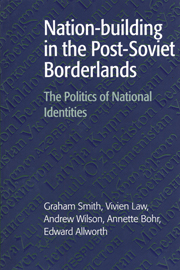Book contents
- Frontmatter
- Contents
- List of figures
- List of tables
- Preface
- The post-Soviet borderland states
- 1 Post-colonialism and borderland identities
- Part I Rediscovering national histories
- 2 National history and national identity in Ukraine and Belarus
- 3 National identity and myths of ethnogenesis in Transcaucasia
- 4 History and group identity in Central Asia
- Part II Ethnopolitics and the construction of group boundaries
- Part III Language and nation-building
- Notes
- Index
3 - National identity and myths of ethnogenesis in Transcaucasia
Published online by Cambridge University Press: 01 June 2011
- Frontmatter
- Contents
- List of figures
- List of tables
- Preface
- The post-Soviet borderland states
- 1 Post-colonialism and borderland identities
- Part I Rediscovering national histories
- 2 National history and national identity in Ukraine and Belarus
- 3 National identity and myths of ethnogenesis in Transcaucasia
- 4 History and group identity in Central Asia
- Part II Ethnopolitics and the construction of group boundaries
- Part III Language and nation-building
- Notes
- Index
Summary
In the post-Soviet period Transcaucasia has been especially prone to violent inter-ethnic conflict, as communities have sought to redefine their relations with neighbouring ‘others’ in localities characterised by a mosaic of interwoven communities whose understandings of sovereign space do not sit easily with the complex realities of ethnic geography. Three large-scale wars have been fought in the region since the late 1980s: between Armenia and Azerbaijan over the enclave of Nagorno-Karabakh, between Georgia and Abkhazia and between Georgia and South Ossetia. The aim of this chapter is not to explain why these wars occurred, but to explore how rival myths of homeland and overlapping ‘claims to indigenousness’ have informed the identities behind such contested understandings of sovereign space. It also seeks to explain the manner in which such myths have contributed to local ethnonationalists’ belief in ‘the inherent right of native peoples to exercise hegemony and fulfil their destiny in their ancestral homeland’.
‘The [home] land’, as ‘the place wherein memory is rooted’, has always been a key building block of national identity, as part of what we have termed the tendency to territorialise ethnic boundary markers. However, it can also be argued that ‘homeland’ is the place where pseudo-memory is encouraged to flourish and where a given group becomes infused with primordial ideas about the eternal state of their nation and the inalienable link with the land that is a gift of trust from their fore-fathers.
- Type
- Chapter
- Information
- Nation-building in the Post-Soviet BorderlandsThe Politics of National Identities, pp. 48 - 66Publisher: Cambridge University PressPrint publication year: 1998



